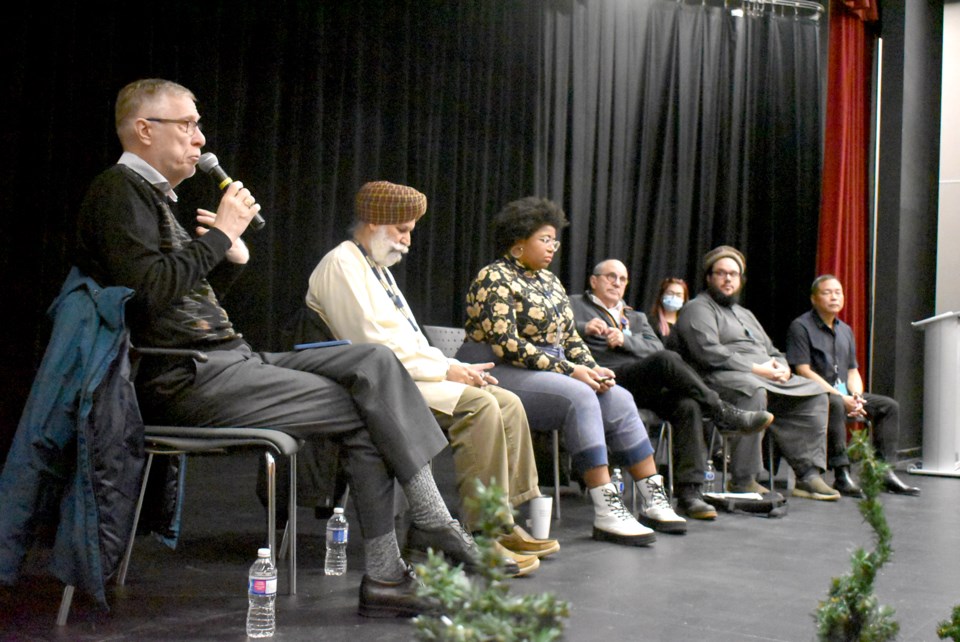Should we listen to Kanye West's music and wear his clothes? Should more accommodations be made for Sikhs carrying a kirpan? How can students get involved in antiracism activities?
These were some of the questions posed by Richmond Secondary students on Thursday morning to a group of people from various faiths and cultural and ethnic backgrounds.
“The Other People” group was speaking to an audience of Grade 10 to 12 students – a few hundred students – about the need to fight racism.
Their point was the better we know people from different backgrounds – the more we get out of our personal silos - the more it combats prejudice and racial discrimination.
Representatives of six different ethnic and faith backgrounds – Muslim, Sikh, Jewish, Christian, Black and Buddhist - talked about their personal experiences. (Normally, they are joined by Jody Wilson-Rayboult to speak about Indigenous experiences.)
Rabbi Phillip Bregman led the panel discussion, talking about how the group came together to fight racism by introducing audiences to the experiences of various faiths and cultural groups.
However, “we are not the definitive inter-faith, inter-cultural group,” he told the audience. For example, while there’s one representative of the Christian faith in the group, there are 40,000 denominations of Christian churches around the globe, representing 2.3 billion people.
And, he added, no faith or cultural group is claiming their tradition is the best, and they are not necessarily without some fault or blame themselves.
Former South Arm United Church minister Gary Gaudin, who represents the Christian religion with The Other People group, has spent his whole life in the United Church. But he acknowledged his religion was involved in the residential school system, which caused harm to Canada’s Indigenous population.
“I have to cope with the reality… (the church) is nothing but a mechanism of destruction for so many generations of First Nations people in Canada,” Gaudin said.
As for listening to Kanye West’s music, Bregman didn’t give a straight answer, rather reframed it as “Can we separate the art from the artist?”
Personally, Bregman said he can’t drive a car named by Hitler – the Volkswagen – but he will fly through Germany because former Chancellor Angela Merkel admitted Germany was responsible for the Holocaust whereby six million Jews were killed.
As for the kirpan, Indirjeet Singh – a Sikh who grew up in Malaysia, went to a Catholic school and did his post-secondary education in the bible belt of Ohio – pointed the word kirpan means “give blessings” and is an article of faith, and is not necessarily supposed to be sharp.
“I’ve seen a gymnast with a kirpan,” he told the Richmond Secondary audience.
The event, the first of its kind in Richmond schools, was organized by Navshina Savory, the school district administrator for equity and inclusion.
Savory hopes to have the presentation on breaking down cultural silos and fighting racism in other Richmond schools in the future.
Getting involved fighting racism
Another Richmond Secondary student asked the panel how they can get involved with antiracism.
Jahmira Lovemore, who grew up in Ontario with Caribbean immigrant parents, answered the question saying “it starts close to where you are.”
When she was in high school, she joined to gay-straight alliance, choosing to advocate for a safe space for those students who identified as LGBTQ.
Racism against Black people has a long history in Canada, including the destruction of Hogan’s Alley in Vancouver to make way for a stretch of highway.
Black people have historically been confined to specific places and treated as second class citizens, which means they “don’t get to thrive” like their white counterparts in Canada, Lovemore explained.
She noted only 0.8 per cent of British Columbians identify as Black, and yet eight per cent of the homeless population is Black.
Growing up in the 1990s, Lovemore said there was a sense that society was in a post-racial world, but even she was subjected to racism in her hometown of North York.
She said antiracism needs to be deliberately taught.
In the 1980s, when Bregman was the rabbi at Temple Sholom, their synagogue was firebombed and burned down. Eventually, they relocated to Oak Street.
But now, in 2022, as they are designing a new temple, they are working to install bullet proof windows.
“I cannot fight it alone, which is why we’re here,” Bregman told the Richmond Secondary students.
Terry Yung, who originates from Hong Kong and is a Buddhist, works for the Vancouver Police Department and is in charge of hate crimes and victim services.
Not all hate crimes reported to police
It’s estimated only 25 per cent of hate crimes are reported to police, Yung said.
He believes everyone has to “band together” to fight racism, to “get indignant to get justice.”
While some people might think stereotypes are harmless, Yung said this isn’t true.
He challenged the students to think about what they should do if they see racist behaviour or discrimination.
“Do you stand by and laugh, or do you say this is wrong?” Yung asked the audience.
This was echoed by Bregman, who referenced a famous quote by the Scottish political philosopher Edmund Burke: “The only thing necessary for the triumph of evil is for good men to do nothing.”



